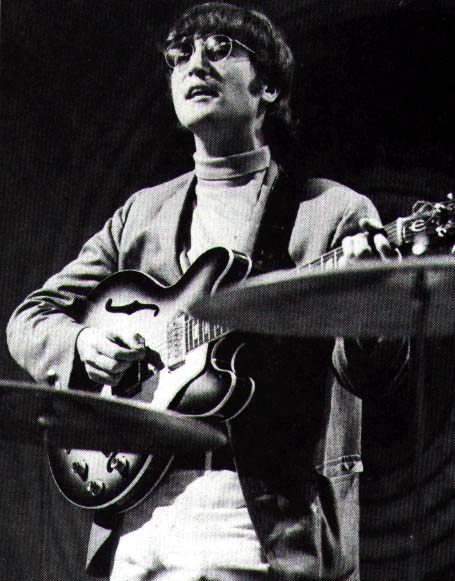| Notes and Quotes: "Tomorrow Never Knows" |
 |
| The text here was inspired
by The Psychedelic Experience (Timothy Leary, Ralph Metzner, and Richard Alpert) and a reworking of material from the Tibetan Book of
the Dead (Kozinn 1995: 137). The recording (filled with tape
loops of the Indian tambura and of drums, bass, piano, and numerous
other instruments) in part recreates the hallucinogenic experience.
Lennon's voice through the twirling Leslie speaker of an electronic
organ also attempts to imitate the impaired ability to perceive.
It might even be said to paint an aural portrait of death. |
| Lennon. That's me in my Tibetan Book of the Dead period. I took one of Ringo's malapropisms as the title, to sort of take the edge off the heavy philosophical lyrics. (Sheff 1981: 161) |
| Lennon: Leary was the one going round saying, take it, take it, take it. And we followed his instructions in his "how to take a trip" book. I did it just like he said in the book and then I wrote "Tomorrow Never Knows," which was almost the first acid song: "Lay down all thought, surrender to the void," and all that shit which Leary had pinched from The Book of the Dead. |
| I read George Martin was saying that John was into The Book of the Dead. I'd never seen it in my life. I just saw Leary's psychedelic handout—it was very nice in them days. |
| We'd had acid on Revolver. Everybody is under this illusion—even George Martin was saying, "Pepper was their acid album." But we'd had acid, including Paul, by the time Revolver was finished. [1972] |
| The expression "tomorrow never knows" was another of Ringo's. I gave it a throwaway title because I was a bit self-conscious about the lyrics. So I took one of Ringo's malapropisms, which was like "a hard day's night," to take the edge off the heavy philosophical lyrics. [1980] (Anthology 209b) |
| Lennon. I couldn't stand [LSD]. I dropped it for I don't know how long. Then I started taking it just before I met Yoko. I got a message on acid that you should destroy your ego, and I did. I was reading that stupid / book of Leary's and all that shit. We were going through a whole game that everybody went through. And I destroyed meself. I was slowly putting meself together after Maharishi bit by bit, over a two-year period. And then I destroyed me ego and I didn't believe I could do anything. I let Paul do what he wanted and say, them all just do what they wanted. And I just was nothing, I was shit. And then Derek [Taylor] tripped me out at his house after he'd got back from L.A. He said, "You're alright." And he pointed out which songs I'd written, and said, "You wrote this, and you said this, and you are intelligent, don't be frightened." the next week I went down with Yoko and we tripped out again, and she freed me completely, to realize that I was me and it's alright. And that was it. I started fighting again and being a loudmouth again and saying, "Well, I can do this." So that's where I am now. |
| [Q: There's a lot of obvious references to LSD in your music. "Tomorrow Never Knows"...] Yeah. |
| [Q: How do you think acid affected your conception of music in general?] Well, it was only another mirror—it wasn't another miracle. It was more of a visual thing, and the therapy that "looking at yourself" bit, it did all that. I don't quite remember. You hear the music, but it didn't write the music, neither did Janoor Maharishi on the same terms... / I write the music in the circumstances in which I'm in, whether it's on acid or in the water. (Wenner 2000: 53/54/55) |
|
| Schedule |
|
21 March, 2012
|
